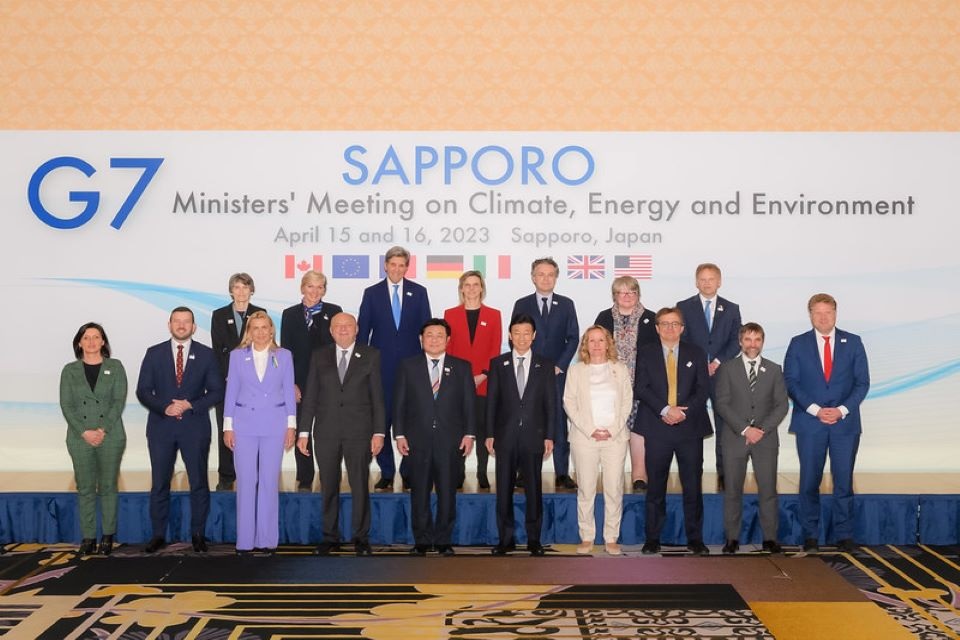G7 Ministers Urge Implementation of Mandatory Climate Disclosure

G7 climate and environment ministers are urging the implementation of mandatory climate-related financial disclosures as a necessary step to accelerate sustainable finance and help achieve global climate goals, according to the communique released by the ministers following the G7 Ministers’ Meeting on Climate, Energy and Environment in Sapporo, Japan this weekend.
The meeting brought together energy and climate officials from Canada, the EU, France, Germany, Italy, Japan, the UK, and the US to discuss climate, energy and environmentalEnvironmental criteria consider how a company performs as a steward of nature. More issues, including commitments and initiatives targeting the achievement of environmentalEnvironmental criteria consider how a company performs as a steward of nature. More global sustainability goals such as accelerating the clean energy transition to net-zero greenhouse gas (GHG) emissions by 2050, and halting and reversing biodiversity loss by 2030.
The communique also included new commitments to significantly increase the deployment of renewable energy capacity this decade and eliminate plastic pollution by 2040. Negotiators succeeded in including a commitment to accelerate the phase-out of unabated fossil fuels, initially opposed by Japan, which relied on fossil fuels for 75% of its energy mix as of 2020.
The call for mandatory climate disclosure comes as several major economies are in various stages of implementing sustainability reporting regimes, such as the EU’s Corporate Sustainable Reporting Directive (CSRD), set to take effect from the beginning of 2024, and the U.S. SEC’s highly anticipated climate disclosure rules, expected to be released shortly. The momentum towards climate reporting may see a step-change forward with the upcoming release of the IFRS Foundation’s International Sustainability Standards Board’s (ISSB) sustainability-related and climate-related disclosure standards, which will be effective as of 2024.
In the communique, the G7 ministers highlighted “the importance of the work of the International Sustainability Standards Board (ISSB) to develop a practical, flexible and interoperable global baseline building on the Task Force on Climate-Related Financial Disclosures (TCFD) framework,” and called for mandatory climate reporting in jurisdictions beyond the G7. The communique said:
“We urge the implementation of mandatory climate-related financial disclosures that provide consistent and decision-useful information for market participants and call for more partners beyond the G7 to join in this effort.”
Following last year’s summit’s commitment to achieve a “predominantly decarbonized power sector by 2035,” the Sapporo summit’s communique included a pledge to “drastically increase electricity generated by renewable energies.” In addition to committing to accelerate a broad range of renewable energy sources, the ministers set collective goals to increase offshore wind capacity by 150 GW and to increase solar PV to more than 1 TW by 2030.
While the inclusion of a commitment “to accelerate the phase-out of unabated fossil fuels” in the communique represented a significant energy transition milestone, efforts by some nations, including Canada to introduce a 2030 goal to phase out coal-fired power were not met.
In a statement following the summit, Canada’s Minister of Environment and Climate Change, Steven Guilbeault, said that “For Canada, phasing out coal-fired electricity generation has never been more urgent,” though he praised the G7 ministers’ “commitment to accelerate coal phase out in a manner consistent with 1.5 C scenario.”
In light of the energy security crisis resulting from the Russian invasion of Ukraine, the communique also included a section on natural gas and LNG, stating that “investment in the gas sector can be appropriate to help address potential market shortfalls provoked by the crisis,” in some circumstances “if implemented in a manner consistent with our climate objectives and without creating lock-in effects.”
Click here to access the G7 communique.
The post G7 Ministers Urge Implementation of Mandatory Climate Disclosure appeared first on ESG Today.